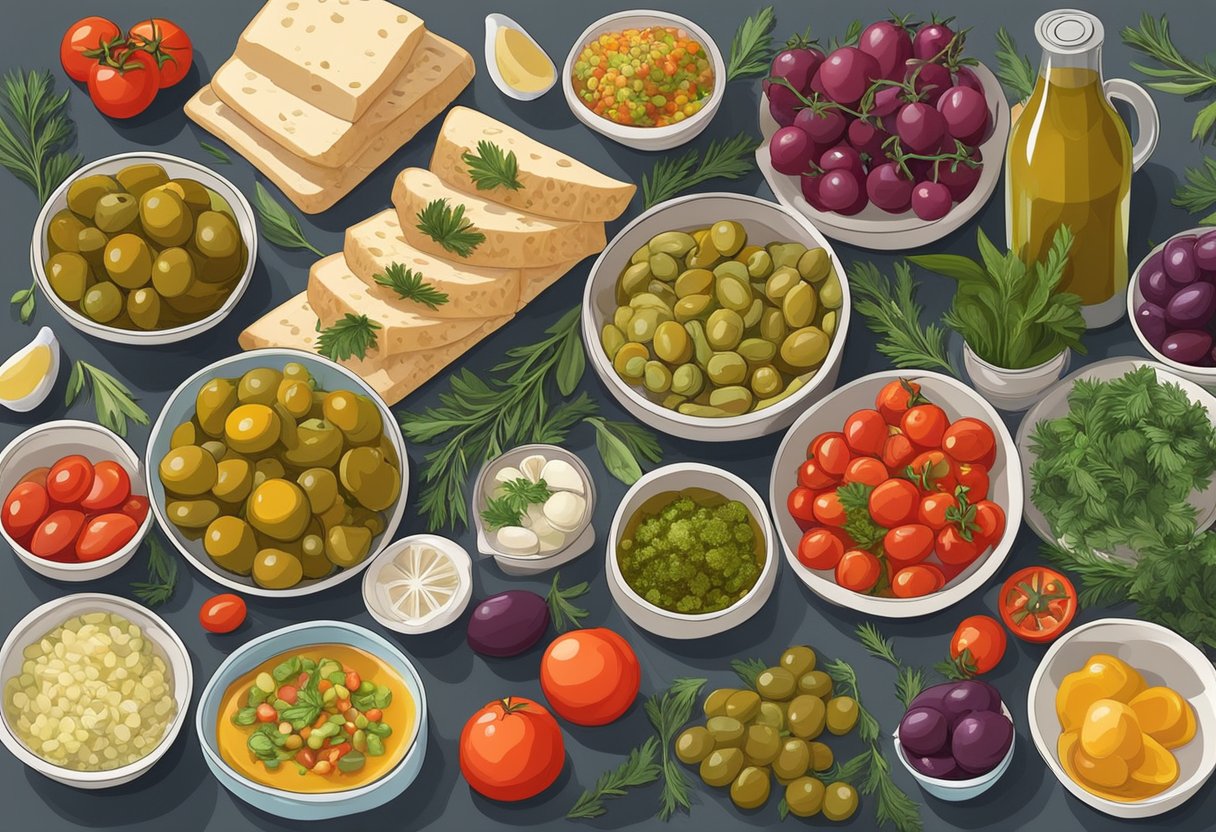Fermented foods have been a cornerstone in culinary traditions worldwide, valued not only for their enhanced flavors and preservation properties but also for their health benefits, particularly for gut health. On the other hand, the Mediterranean diet, renowned for its heart-healthy and anti-inflammatory qualities, emphasizes fruits, vegetables, whole grains, legumes, and healthy fats. When combined with a gluten-free regime, this dietary pattern sustains those with gluten sensitivities or celiac disease, ensuring they don’t miss out on the diet’s wide-ranging health benefits.

Understanding the symbiotic relationship between the microbiota and our overall well-being leads to the incorporation of fermented foods into a gluten-free Mediterranean diet. These foods introduce beneficial bacteria to the digestive system, which can enhance the immune system, improve digestion, and reduce inflammation. This integrative approach to eating could lead to a more diverse gut microbiome, potentially translating to improved health outcomes.
Key Takeaways
- Fermented foods enhance the gluten-free Mediterranean diet by supporting gut health.
- Incorporating fermented items into the diet boosts beneficial gut bacteria and digestion.
- A diverse gut microbiome from fermented foods can reduce inflammation and improve immunity.
Table of Contents
Basics of Fermented Foods
Fermented foods play a pivotal role in enhancing gut health, particularly within the context of a gluten-free Mediterranean diet. They create a hospitable environment for beneficial bacteria, offering a wealth of advantages for digestive wellness.
What Are Fermented Foods?
Fermented foods are those that have undergone a process where natural bacteria feed on the sugar and starch in the food, creating lactic acid. This process not only preserves these foods but also creates beneficial enzymes, b-vitamins, omega-3 fatty acids, and various strains of probiotics. Notably, on a gluten-free Mediterranean diet, one would focus on fermented foods that do not contain gluten, such as certain yogurts, kefir, sauerkraut, kimchi, and traditionally made pickles.
Benefits of Fermentation
The fermentation process enhances the nutritional value of food, making certain nutrients more digestible and bioavailable. It’s been suggested by research at institutions such as Harvard Health that fermentation boosts the nutritional value and may improve digestion. Notably, fermented foods can contribute to a higher diversity of gut microbes and potentially lower inflammation markers, as observed by researchers at Stanford School of Medicine.
Role of Bacteria in Fermented Foods
Beneficial bacteria, particularly lactic acid bacteria, are the primary agents that drive the fermentation process. These bacteria are not only crucial in fermenting food but also in maintaining a balanced gut microbiome. They yield beneficial effects by enhancing the body’s immune function and digestive health. On a gluten-free Mediterranean diet, these bacteria are even more essential as they help in the assimilation of nutrients from a restricted variety of food sources.
Gut Health Foundations
In the pursuit of gut health, especially within a gluten-free Mediterranean diet, the role of fermented foods cannot be overstated. They are a rich source of probiotics that support a diverse and robust microbiome.
Gut Microbiome and Fermentation
The gut microbiome is a complex community of microorganisms living in the digestive tracts. It’s instrumental in digestion, immune function, and overall health. Fermentation is a metabolic process that produces lactic acid, which not only preserves the food but also fosters a favorable environment for beneficial bacteria to thrive.
These microorganisms, including probiotics, are key to maintaining the delicate balance of the gut microbiome. They can help break down food, synthesize essential nutrients, and protect against pathogenic bacteria. Consuming fermented foods on a gluten-free Mediterranean diet offers a natural way to enhance this microbial diversity.
Link Between Gut Health and Fermented Foods
The consumption of fermented foods is directly tied to the improvement of gut health. Through the introduction of beneficial bacteria, such as those found in yogurt and kefir, these foods contribute to a flourishing gut microbiome.
Studies suggest that incorporating fermented foods in a diet can lead to an increase in microbiome diversity and a decrease in inflammatory markers. These effects are particularly beneficial for those on a gluten-free Mediterranean diet, which emphasizes whole foods and plant-based nutrition. Fermented foods not only complement this diet but also ensure that the gut is well-equipped with the necessary microorganisms for optimal function.
Implementing the Gluten-Free Mediterranean Diet
Transitioning to a gluten-free Mediterranean diet involves combining the heart-healthy aspects of the traditional Mediterranean diet with the dietary restrictions necessary for those with gluten sensitivities or celiac disease. The approach prioritizes natural, unprocessed foods that support overall well-being.
Basics of the Gluten-Free Mediterranean Diet
The foundation of the gluten-free Mediterranean diet lies in an abundance of fruits, vegetables, and gluten-free whole grains, such as quinoa and brown rice. Olive oil serves as the main source of healthy fats, replacing saturated fats found in butter and other oils. Legumes, including lentils and chickpeas, are a staple, providing plant-based protein and fiber. Fish as a primary protein source is emphasized over red meat, which is consumed less frequently.
Daily Intake:
- Fruits, vegetables, legumes, seeds, nuts
- Whole grains (gluten-free)
- Olive oil as the primary fat source
Weekly Intake:
- Fish and seafood, at least twice a week
- Poultry, eggs, dairy (cheese, yogurt) in moderate amounts
- Red meat limited to a few times a month
Fermented Foods in the Mediterranean Diet
Fermented foods, a vital component of the diet, enhance gut health by providing beneficial bacteria. They include:
- Gluten-free yogurt
- Kefir
- Sauerkraut (ensuring it’s made without wheat-based vinegar)
In the gluten-free Mediterranean diet, these fermented products should be chosen carefully to avoid gluten-containing grains or additives, ensuring they are labeled as certified gluten-free. Their regular consumption can contribute to a more diverse and resilient gut microbiome.
Key Fermented Foods and Ingredients
When considering a gluten-free Mediterranean diet, it’s crucial to include fermented foods that provide probiotics and essential nutrients without gluten. The inclusion of these foods supports digestive health and can enhance overall well-being.
Fermented Dairy Products
Yogurt and Kefir stand as pillars in this category, both derived from milk yet suitable for a gluten-free diet. Kefir is unique, fermented with kefir grains, which impart numerous beneficial bacteria and yeasts. Both these fermented dairy products are rich in probiotics and can be made from cow’s, goat’s, or sheep’s milk.
-
Aged Cheeses: Not all cheese is created equal in terms of fermentation. Look for aged cheeses like Parmesan, which typically contain less lactose and are well-suited for a gluten-free Mediterranean lifestyle.
-
Sour Cream and Cottage Cheese: These can also be integrated, providing additional textures and flavors to the diet.
Non-Dairy Fermented Foods
Non-dairy options are abundant as well, catering to those who may be lactose intolerant or vegan.
- Kimchi: This Korean staple made from fermented cabbage and various spices, offers a spicy kick and fiber-rich addition to the diet.
- Sauerkraut: It is essentially fermented cabbage, offering similar digestive benefits as kimchi but with a milder taste profile.
Fermented Vegetables and Legumes
Legumes, such as chickpeas and lentils, can be fermented to boost their nutrient profile while remaining an integral part of a gluten-free Mediterranean diet.
- Fermented Vegetables: Include a variety of vegetables like carrots, cucumbers, and radishes, which can be lacto-fermented to preserve them while enhancing their gut-friendly properties.
- Fiber-Rich Foods: Beyond fermentation, consuming plenty of fiber through vegetables helps support a healthy gut microbiome.
Nutritional and Health Benefits
Fermented foods are a valuable addition to a gluten-free Mediterranean diet, offering distinct nutritional components and impacting bodily health in various positive ways.
Nutritional Components of Fermented Foods
Fermented foods are nutrient-dense, often containing higher levels of essential nutrients compared to their unfermented counterparts. They provide a rich source of protein, which is crucial for muscle repair and growth. Calcium is also more bioavailable in fermented products, contributing to stronger bone health. Due to fermentation, these foods can enhance the presence of B-vitamins and antioxidants, aiding in overall nutrient intake for those on a gluten-free diet.
Health Impact of Fermented Foods on the Body
The regular consumption of fermented foods can play a vital role in maintaining a healthy immune system. Probiotics found in these foods boost immunity and have anti-inflammatory properties that can reduce systemic inflammation. This supports not only efficient digestion but may also contribute to lower blood pressure and improved cognitive function. Including fermented foods in one’s diet aligns well with the Mediterranean approach to nourishment, emphasizing whole foods for optimal health.
Special Diets and Considerations

Incorporating fermented foods into a gluten-free Mediterranean diet requires attention to individual dietary restrictions and the potential for adverse reactions. This ensures a safe and beneficial integration of these nutrient-rich foods.
Fermented Foods for Specific Dietary Needs
For individuals with celiac disease, a gluten-free diet is essential to avoid the health issues associated with gluten consumption. They often turn to fermented foods such as kimchi and kombucha, which are naturally gluten-free, to enhance gut health. However, it’s important to read labels carefully, as some fermented products may be cross-contaminated with gluten.
Those with lactose intolerance or following a dairy-free diet can find solace in non-dairy based fermented options. Choices like sauerkraut and water kefir are lactose-free and align with their digestive needs while still contributing to a balanced gut microbiome.
The vegan population can also benefit significantly from fermented foods. Selections like tempeh and miso, which are rich in probiotics and other nutrients, offer a means to support gut health without animal products. Consultation with a registered dietitian is advisable for personalized advice, especially when dealing with allergies or autoimmune diseases to ensure nutritional adequacy and safety.
Potential Risks and Side Effects
While fermented foods are advantageous for many, they can also carry risks and side effects. Some individuals may experience bloating, gas, or more severe allergic reactions. It’s critical for those with a compromised immune system or existing gut issues to proceed with caution and possibly seek guidance from a healthcare professional.
For the majority, these foods are a safe addition to their diet, but for others with allergies or autoimmune conditions, certain fermenting agents or ingredients in these foods can exacerbate symptoms. It’s essential to introduce new fermented foods slowly and to be aware of any ingredients that may be a concern for specific health conditions.
Preparation and Cooking
Exploring the rich and varied practice of fermentation, one finds a remarkable way to enhance flavors and improve gut health on a gluten-free Mediterranean diet. Creating these beneficial foods at home not only serves to control ingredients used, ensuring the absence of gluten, but also instills a deeper connection to the food we consume.
Making Fermented Foods at Home
When one embarks on the journey of fermenting foods at home, there are a few key elements they must consider. A balance of sugar and salt is crucial, as these components not only flavor the food but also act as preservatives and fermentation agents. Brown rice and apple cider vinegar can serve as bases for creating homemade pickles or kimchi, which can incorporate various flavors through the addition of spices and herbs.
- Ingredients:
- 1 cup brown rice, cooked
- Gluten-free soy sauce
- 2 tablespoons apple cider vinegar
- 1-2 teaspoons salt
- 2 teaspoons sugar
- Assorted vegetables
- Spices and herbs (e.g., garlic, dill)
- Instructions:
- Combine vinegar, salt, sugar, and gluten-free soy sauce to create a brine.
- Chop vegetables into bite-sized pieces.
- Add spices and herbs to the mixture.
- Place vegetables in a clean jar and pour the brine over them.
- Seal the jar and let it sit at room temperature for several days.
Incorporating Fermented Foods into Meals
Introducing fermented foods into one’s diet is a simple yet transformative process. One can enhance the flavor and nutritional profile of gluten-free Meditteranean dishes by incorporating tofu marinated in gluten-free soy sauce and vinegar, or by adding tangy fermented rice to salads for an extra layer of texture.
- Recipe Suggestion:
- Gluten-free pasta with fermented tofu and roasted vegetables
- Marinate tofu in gluten-free soy sauce and apple cider vinegar before roasting.
- Toss gluten-free pasta with olive oil, roasted vegetables, and cubed fermented tofu.
- Garnish with fresh herbs like basil or oregano for an aromatic touch.
- Gluten-free pasta with fermented tofu and roasted vegetables
Through fermentation, one can cultivate a symphony of robust and healthful flavors pivotal to the gluten-free Mediterranean palate. Whether it’s in the careful preparation of the ingredients or the creative incorporation into meals, these fermented delights are both a culinary journey and a benefit to one’s well-being.
Scientific Insights and Research
Recent research delves into the connection between fermented foods and improved gut health, and how this relationship might play a role in preventing and managing chronic diseases. These investigations are especially pertinent for those following a gluten-free Mediterranean diet, which prioritizes naturally gluten-free, fermented foods that are rich in probiotics.
Studies on Fermented Foods and Gut Health
Researchers have consistently found that fermented foods are beneficial to gut health. For instance, a study published by PMC reveals that these foods contain bioactive peptides and microbial metabolites, which have a positive impact on health by favoring a diverse population of gut microorganisms. This is particularly consequential for individuals with conditions like irritable bowel syndrome or inflammatory bowel disease where gut flora balance is often compromised.
Emerging Research on Fermentation and Chronic Diseases
Emerging research suggests that a diet inclusive of fermented foods could be instrumental in managing and potentially preventing chronic diseases. A clinical trial noted by Stanford School of Medicine demonstrated that diets high in fermented foods can increase the diversity of gut microbes and decrease inflammation. This finding is significant as inflammation is a common underpinning of chronic diseases including diabetes, obesity, and colorectal cancer. Furthermore, the adoption of a gluten-free Mediterranean diet, characterized by a high intake of these fermented foods, might offer a protective effect against the onset and progression of type 2 diabetes and other metabolic disorders.
Shopping and Storage Tips

When embarking on a gluten-free Mediterranean diet, it is crucial to select the right fermented foods and store them properly to maintain their probiotic benefits.
Selecting Fermented Foods at Stores
Health food stores often provide a wealth of suitable options for those following a gluten-free Mediterranean diet. Look for fermented grains like gluten-free sourdough or fermented rice, which must be clearly labeled as such to ensure they do not contain gluten. Probiotic foods such as yogurt, kefir, and certain types of cheese can be found in their gluten-free versions. Be mindful of the sodium content in fermented products and opt for lower sodium varieties to align with the Mediterranean diet’s emphasis on heart health.
Storing and Preserving Fermented Foods
Once purchased, proper food preservation is key to extending the shelf-life of fermented goods and keeping them safe for consumption. Store pasteurized fermented foods in the refrigerator to slow down bacterial activity; these products have already been heated to kill bacteria and therefore do not contain live probiotics. Non-pasteurized, live-culture fermented foods should also be refrigerated, but they will continue to ferment slowly, potentially changing in flavor and texture over time. Keep these items in air-tight containers to prevent unwanted contamination and preserve their beneficial properties.
Recipes and Meal Ideas

Incorporating fermented foods into a gluten-free Mediterranean diet can enhance gut health with delicious flavor profiles. Below, find curated recipes and innovative meal suggestions that pair well with this lifestyle.
Delicious Fermented Food Recipes
Sauerkraut Soup: A hearty and gut-friendly soup that combines sauerkraut with other vegetables, such as carrots and potatoes, adding a rich probiotic element to the meal.
Kombucha-Marinated Fish: Utilize kombucha as a tangy marinade for fish dishes to infuse unique flavors while also capitalizing on its probiotic benefits.
Miso Vegetable Stir-Fry: Incorporate gluten-free miso paste in a vegetable stir-fry, teeming with colorful Mediterranean veggies like zucchini, bell peppers, and tomatoes.
Beet Kvass Mocktail: Create refreshing and health-promoting beverages by blending beet kvass with sparkling water and freshly squeezed citrus fruit for a sweet and tangy drink.
Creative Ways to Include Fermented Foods in a Gluten-Free Diet
Fruit & Kombucha Breakfast Bowl: Start the day with a vibrant bowl of fresh fruit topped with a drizzle of kombucha, offering a lively, probiotic boost alongside natural sugars.
Black Tea & Pickles Snack Combo: Elevate snack time with a pairing of antioxidant-rich black tea and homemade pickles from a variety of seasonal vegetables.
Fermented Tea Leaves Salad: Transform a simple leafy green salad by adding fermented tea leaves for a unique twist on a gluten-free Mediterranean staple.
Lifestyle and Wellness
A gluten-free Mediterranean diet enriched with fermented foods may contribute to improved health and nutritional outcomes.
Incorporating Fermented Foods into a Healthy Lifestyle
Incorporating fermented foods into one’s diet can be a strategic move for adults who are mindful of their nutritional needs. These foods are not only nutritious but also promote a good balance of gut bacteria, which is crucial for metabolism and weight management. For instance, including options like sauerkraut as part of their meals provides them with probiotics and dietary fiber without compromising gluten-free restrictions.
Impact of Fermented Foods on Overall Wellness
The impact of fermented foods on overall wellness is substantial, as they fortify the body’s nutrition and can be a key factor in preventing obesity. Eating fermented foods as part of a Mediterranean diet also tends to increase the intake of health-boosting fruits, vegetables, and legumes, which further enhances an individual’s lifestyle by optimizing their digestion and absorption of nutrients.
Frequently Asked Questions
This section addresses common inquiries regarding the integration of gluten-free fermented foods within the Mediterranean diet for enhanced gut health.
What are some gluten-free fermented foods that complement the Mediterranean diet?
Gluten-free fermented foods compatible with the Mediterranean diet include sauerkraut, kefir made with coconut or almond milk, and fermented vegetables like olives and capers. These items can be seamlessly included in various Mediterranean dishes for added probiotics.
How can incorporating fermented foods into a gluten-free Mediterranean diet benefit gut health?
Inclusion of fermented foods in a gluten-free Mediterranean diet helps increase the diversity of gut microbes and reduce inflammation markers. They supply beneficial bacteria that aid digestion and strengthen the gut barrier.
What frequency of consuming fermented foods is recommended for improving gut health?
The optimal frequency for consuming fermented foods has not been universally established. However, incorporating them regularly and in moderation into meals can help maintain a balanced gut microbiome.
Which individuals should be cautious about introducing fermented foods into their diet?
Individuals with histamine intolerance or those prone to yeast overgrowth, such as those with candida, should be cautious. They may require tailored guidance from healthcare professionals before adding fermented foods to their diet.
How might fermented foods influence inflammatory responses in the context of a gluten-free Mediterranean diet?
Fermented foods have been shown to lower molecular signs of inflammation. A gluten-free Mediterranean diet that includes these foods may mitigate inflammatory responses due to the presence of probiotics.
What are some simple gluten-free fermented food recipes that align with the Mediterranean diet principles?
Simple recipes include homemade gluten-free sourdough for bruschetta, Greek salad with feta and fermented olives, or a refreshing kefir smoothie with fresh fruit typical of the Mediterranean region.



